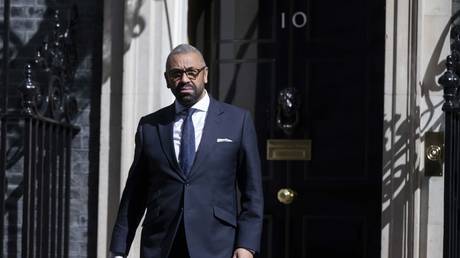UK shows signs of good will to China, but it’s not the one calling the shots in this relationship
The British foreign secretary says antagonizing Beijing goes against London’s ‘national interests’, but Washington has other ideas

UK shows signs of good will to China, but it’s not the one calling the shots in this relationship
By Timur Fomenko, a political analyst

British Foreign Secretary James Cleverly has claimed in a recent keynote speech that trying to “isolate China” would constitute a “betrayal of [the UK’s] national interests” and spoke out against a “new Cold War.”
Although he denounced Beijing on a range of issues, including Hong Kong and the alleged human rights violations in Xinjiang, Cleverly’s underlying message was: “No significant global problem – from climate change to pandemic prevention, from economic stability to nuclear proliferation – can be solved without China.”
The speech is arguably the most dovish given by a UK official under the government of Rishi Sunak, who had opened up his premiership by declaring the end of the “golden era” of relations between the two countries and calling for “robust pragmatism” in handling Beijing. Despite this, Britain’s foreign policy has steered towards being increasingly hawkish and Sunak skipped the opportunity to meet with Xi Jinping at the G20 summit, as backbench hardliners including disgraced former prime minister Liz Truss and China hawk Iain Duncan Smith, call for a much more confrontational approach.
Can the UK feasibly improve its relations with China to suit its own national interests? The answer is no, it can’t, because it is ultimately not Britain who calls the shots. It has not been able to demonstrate any meaningful degree of independence in opposing the US policy on China, and when Washington says jump, London asks, ‘how high?’ The Americans have helped cultivate a hostile media climate combined with the constant promotion of ultra-hawkish figures, which places severe limits on how the UK can deepen its relationship with China.
The US exerts influence over its allies by manipulating their “civil society,” – the paradigm of public debate and focus – towards its goals. It does this by utilizing its resources, groups, funding, NGOs, think tanks and associated journalists in order to establish a news cycle favorable to itself, playing up the issues that suit its agenda, and playing down those that do not. Through this method, Washington has been able to weaponize public opinion in the West and turn it against China, creating a hostile climate irrespective of what the given country’s government might intend, and therefore changing the political incentives for all involved.
For example, by weaponizing the Xinjiang issue and misleadingly framing it as “genocide,” the US was able to exploit the human rights outrage of Western “civil society” to place pressure on governments and legitimize foreign policy shifts. The UK, which was favorable towards China in its foreign policy and public disposition in past years, is one of the examples of how such manipulation and direct pressure changed the game. While the Boris Johnson government initially advocated for economic engagement with China, the hostile climate which followed has created a firestorm of media negativity towards Beijing and encouraged politicians who vehemently oppose it, such as Iain Duncan Smith or Liz Truss.
It is precisely because of these circumstances that London has found it nearly impossible to pursue its own independent engagement with Beijing, and has capitulated on every public disagreement it has had with the US on China policy. For example, the government wanted Huawei to participate in the UK’s 5G network and cleared it as safe, only to then make a U-turn because of American pressure and suddenly brand it as a “national security risk.” Similarly, the government approved the Chinese-led takeover of the Newport Wafer Fabrication Plant in Wales, but a year later caved in to Washington’s demands and vetoed the sale, something which has financially ruined the plant and put jobs at risk.
The UK government does not control the terms of any engagement it might like to have with Beijing, and even Rishi Sunak himself, although privately more dovish than someone like Liz Truss, is blatantly open to the idea of using China bashing and paranoia for political gain when he gets the chance. This is a feature of the post-Boris Johnson political consensus in the Conservative Party. Likewise, London is pursuing a militarist, “gunboat diplomacy” stance by participating in the US “Indo-Pacific” strategy of containing Beijing.
These conditions are likely why China currently sees engaging with the UK as a waste of time. Thus, while Cleverly’s speech may be diplomatically positive, it is unlikely to be followed up with any real results because an extremely hostile media environment and hawkish agitators will continue to derail the relationship wherever possible.
The statements, views and opinions expressed in this column are solely those of the author and do not necessarily represent those of RT.












